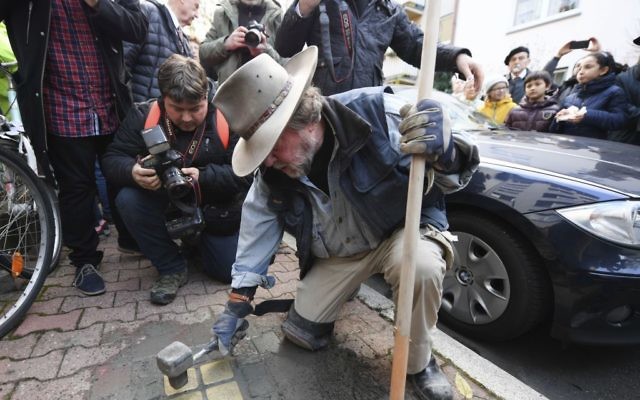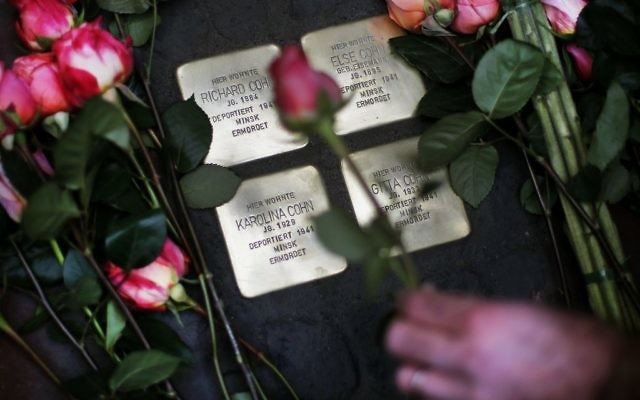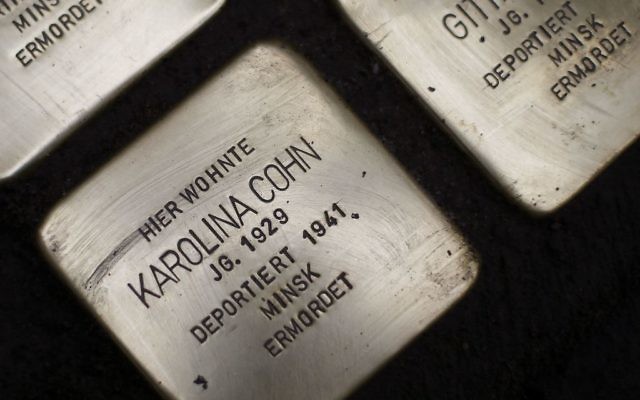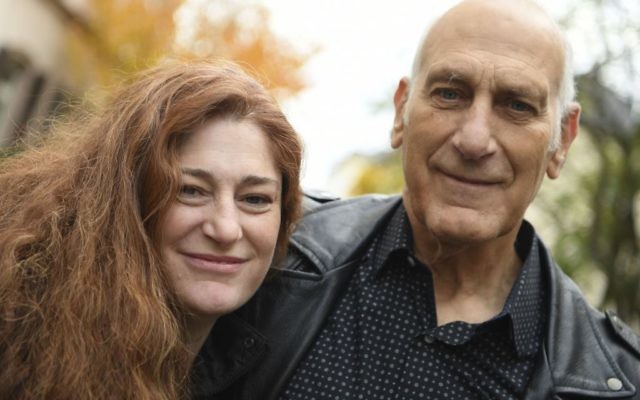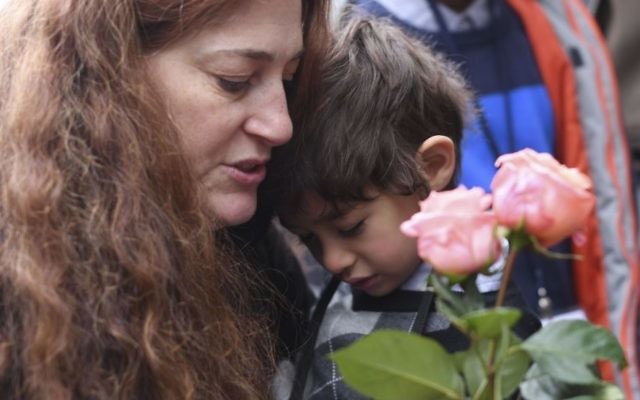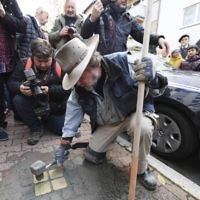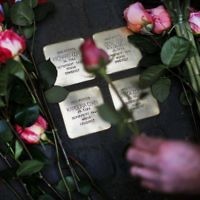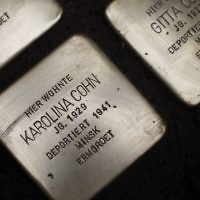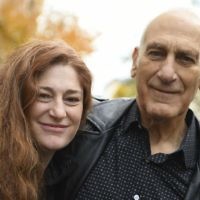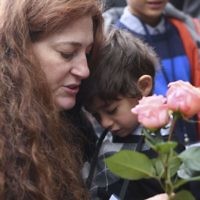Relatives meet for the first time at memorial ceremony for Shoah victim in Germany
More than two dozen people from around the world gathered as four brass plaques are inaugurated in memory of a Jewish girl from Frankfurt who died in the Holocaust.
More than two dozen relatives from around the world have met for the first time at a memorial ceremony for a Jewish girl from Frankfurt who died in the Holocaust.
Four little brass plaques for Karolina Cohn, her sister and parents were laid in front of the Frankfurt location where the family lived before they were deported on November 11 1941, when Karolina was 12.
“It’s pretty remarkable, that this little girl brought together this broken-up, fragmented family,” said Mandy Eisemann, a relative from the United States, who took part in the ceremony and afterward laid pink roses on the shiny plaques known as “Stolpersteine”, or stumbling stones.
The story of Karolina’s life and death had been all but erased by the Nazis, until archaeologists last year unearthed a silver pendant engraved with her birthdate and birthplace at the grounds of the former Sobibor death camp in eastern Poland.
With the help of Nazi deportation lists, researchers identified Karolina as the owner of the amulet.
It is almost identical to one belonging to famous Jewish diarist Anne Frank, though it is not clear whether the two girls knew each other. Both were born in Frankfurt in 1929.
The triangle-shaped pendant was found by an Israeli-Polish archaeologists’ team under the ruins of a hut where the women’s hair was shaved before they were led to the gas chambers.
It is not clear whether Karolina was ever taken to Sobibor or whether she gave the amulet to somebody else who brought it there.
All traces of Karolina disappear after she and her family were deported to the Minsk Ghetto in late 1941.
After the pendant was linked to the German girl last year, a genealogist started tracking down family members and found about 40 relatives in Israel, the US, Italy and Japan.
Many of them had never heard about Karolina and her family, but more than two dozen accepted an invitation from the Jewish Claims Conference to meet in Germany for the ceremony and a reunion.
“It’s a heart-warming emotion to meet family who were strangers to us before today,” said Barry Eisemann, the father of Mandy and a first cousin of Karolina.
“But it’s a heart-wrenching emotion… to know that Karolina and the entire family perished in the Holocaust.”
Holding a replica of the pendant, Greg Schneider, the vice president of the Jewish Claims Conference, reminded the more than 100 participants of the ceremony than Karolina was one of 1.5 million children who were murdered in the Holocaust.
“It’s almost too painful to think about what was done to this girl,” he told The Associated Press in a phone interview on Sunday.
“But we don’t have the moral right to forget Karolina.”
- Artist Gunter Demnig lays four “Stolpersteine” (stumbling blocks) for Karolina Cohn and her family in Frankfurt, Germany, Monday, Nov. 13, 2017. Relatives participated in a memorial ceremony for Karolina Cohn, a Jewish girl from Frankfurt who perished in the Holocaust more than 70 years ago. The story of her life and death had been all but erased by the Nazis, until archeologists last year unearthed a silver pendant engraved with her birth date and birthplace at the grounds of the former Sobibor death camp. (Arne Dedert/dpa via AP)
- Roses are laid on four “Stolpersteine” (stumbling blocks) for Karolina Cohn and her family in Frankfurt, Germany (AP Photo/Michael Probst)
- “Stolpersteine” (stumbling blocks) have been laid for Karolina Cohn and her family at a place where they once lived in Frankfurt, German(AP Photo/Michael Probst)
- Barry Eisemann from Dickerson, Maryland, and his daughter Mandy, relatives of the Cohn family, attend the laying of four “Stolpersteine” (stumbling blocks) for Karolina Cohn and her family in Frankfurt, Germany, (Arne Dedert/dpa via AP)
- Mandy Eisemann from Dickerson, Maryland. with her son Levi (4), relatives of the Cohn family, places flowers at four “Stolpersteine” (stumbling blocks) for Karolina Cohn and her family in Frankfurt, Germany (Arne Dedert/dpa via AP)

Thank you for helping to make Jewish News the leading source of news and opinion for the UK Jewish community. Today we're asking for your invaluable help to continue putting our community first in everything we do.
For as little as £5 a month you can help sustain the vital work we do in celebrating and standing up for Jewish life in Britain.
Jewish News holds our community together and keeps us connected. Like a synagogue, it’s where people turn to feel part of something bigger. It also proudly shows the rest of Britain the vibrancy and rich culture of modern Jewish life.
You can make a quick and easy one-off or monthly contribution of £5, £10, £20 or any other sum you’re comfortable with.
100% of your donation will help us continue celebrating our community, in all its dynamic diversity...
Engaging
Being a community platform means so much more than producing a newspaper and website. One of our proudest roles is media partnering with our invaluable charities to amplify the outstanding work they do to help us all.
Celebrating
There’s no shortage of oys in the world but Jewish News takes every opportunity to celebrate the joys too, through projects like Night of Heroes, 40 Under 40 and other compelling countdowns that make the community kvell with pride.
Pioneering
In the first collaboration between media outlets from different faiths, Jewish News worked with British Muslim TV and Church Times to produce a list of young activists leading the way on interfaith understanding.
Campaigning
Royal Mail issued a stamp honouring Holocaust hero Sir Nicholas Winton after a Jewish News campaign attracted more than 100,000 backers. Jewish Newsalso produces special editions of the paper highlighting pressing issues including mental health and Holocaust remembrance.
Easy access
In an age when news is readily accessible, Jewish News provides high-quality content free online and offline, removing any financial barriers to connecting people.
Voice of our community to wider society
The Jewish News team regularly appears on TV, radio and on the pages of the national press to comment on stories about the Jewish community. Easy access to the paper on the streets of London also means Jewish News provides an invaluable window into the community for the country at large.
We hope you agree all this is worth preserving.


